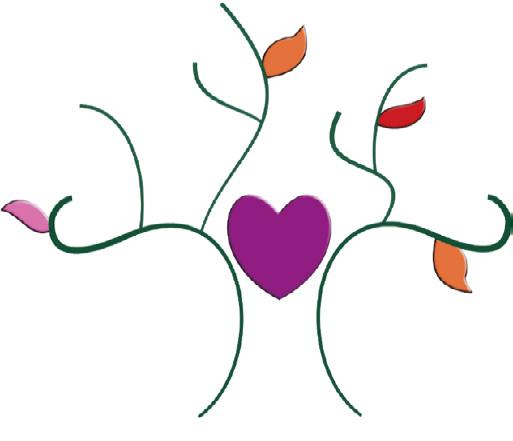
9 minute read
Lily – Supermum
At first Lily ignored the calls on her phone. She assumed they were spam, but her mystery caller turned out to be the local radio station telling her she had won a Mum of the Year hero award. It was a defining moment for Lily, a single mother of four who had battled for years to convince social services she was a competent parent. On winning the award, she initially felt “a little bit fraudulent” – a reaction rooted in her own insecurities. “Part of me wanted to take it to social services and put it on their desk,” she says teasingly, “just to prove a point.” Sitting in a quiet café, Lily laughs at the memory. In fact, she laughs a lot for someone who has been through several adverse childhood experiences (ACEs) as well as a large dose of adult trauma.
Advertisement
This abstract image was designed especially for Lily. The tree represents her personal growth – the heart symbolises Lily while the leaves on the tree are for each of her children.
At 37, Lily is fresh-faced, vivacious and outwardly confident. She is a prime example of someone who has dug deep and found the strength to overcome multiple obstacles in her path. Her lifestory demonstrates that ACEs need not define your destiny. Lily grew up in an unhappy household, abused by her parents, until she came home one day, aged 15, to find the locks had been changed and all of her possessions were strewn across the garden. “I pretty much moved out from there.” Later she faced custody battles with an abusive partner, societal prejudice and an ongoing struggle to find a diagnosis for her son’s complex additional needs. “I have four children with three different dads,” she says. “Instantly people go, ‘Oh right, okay, there we are.’ But it wasn’t like I slept around or they weren’t long-term relationships. They didn’t work out for lots of reasons.”
The story of Lily’s ACEs begins with her parents’ dysfunctional relationship. She was the third of four children. Growing up, she was feisty and suffered physical abuse at the hands of her father, while her mother inflicted emotional abuse. “They had their own problems,” she says. “I can’t tell you where it all stemmed from but they had their issues with regards to abuse within the relationship.” In one incident, Lily upset her father and was sent to bed in disgrace with no dinner. “He woke me up in the early hours and stuffed a sock in my mouth and beat me with a trainer,” she says, her words speeding up as she recounts the memory.
13 When Lily was 12, her mother announced she was leaving home. “Her words were, ‘I’ve done my time now, I’ve brought you all up, it’s time for me to do time for myself,’ and she left.” Lily’s father was away in the Falklands with the RAF so the family was temporarily looked after by her grandmother – “She didn’t stay very long; she wasn’t a maternal person either.” When Lily’s father returned, he started a relationship with an 18-year old whom he later married. Lily’s two older brothers had already moved out, but she and her younger sister remained at home with their new stepmother. “I was about 15 – it sounds a bit like a Cinderella story – I had my chores and that was my place, as well as being at school and looking after my sister.” Lily’s stepmother – who was only five years older – was emotionally manipulative and found fault with everything she did.
After Lily left home, she found succour in her relationship with a childhood sweetheart. At 17, she fell pregnant; they got married and moved in together. Unfortunately, the relationship petered out although the two of them have remained close friends. Lily’s younger sister, who was struggling to cope with the family dynamics at home, came to live with Lily and her two-year old son. “I kind of thrive on this – not fix things – but do the right thing and make it better for somebody,” she says.
Lily met her next partner aged 22. “He was very charming, very lovely, I was very drawn in… Coming from the background I came from, for someone to be charming and woo you, it’s very attractive when you’ve kind of yearned and longed for that.” They had two boys together, but Lily soon discovered that he was having affairs behind her back. When she confronted him, he became abusive. After six years together, their discord reached a climax when he attacked her in the house while the boys were asleep in bed. Lily decided she and her sons were better off without him. “I didn’t want my children to look back at their childhood and think how rubbish it was… they deserve better.”
Two months after the split, Lily returned home from celebrating a friend’s birthday. “He was lying in wait for me, in the early hours of the morning in the dark. He forced his way into the house – where my sister and her partner were babysitting for me – attacked the three of us, smashed up our mobile phones, threw me over a bannister.” Her ex-partner was later convicted of two counts of assault and battery, as well as two counts of criminal damage, while being put under a restraining order. He was given 200 hours of community service, narrowly escaping a prison sentence.
Once the restraining order had lapsed, Lily faced years of trawling through the courts to gain custody of her children. She believes her former partner hoodwinked social workers into thinking she was incapable of looking after her sons because of her family background. It led to some of her bleakest hours. “There was a moment when I thought maybe I am crazy, maybe I am so delusional about my ability as a parent because I had nothing to compare it to… but thankfully I never settled for it.”
To bolster her case, Lily agreed to go on various parenting courses. “I did everything they asked of me – if they asked me to jump through a hoop, I jumped through a hoop.” She took the high road, learning what she could to support her kids. “Don’t get me wrong I had my dark moments when I wanted to stamp my feet and have a tantrum, but that wasn’t going to help anybody.” Ultimately, the parenting classes taught her she was doing a better job than she realised. “I learnt to be confident in my decisions and also that I wasn’t my parents, which was lovely to know.” She eventually won custody of her sons, with strict visitation rights for their father, who had physically abused the younger son. Her expartner has since distanced himself from the family and no longer sees his children. “… I learnt to be confident in my decisions …”
During this time, Lily’s younger son was growing increasingly troubled. When Lily sought help, social services were initially focused on the family’s litany of adverse experiences. “The first thing they did was bring out this tick-box – ‘Oh, there’s a domestic violence background, she’s from a split family, she comes from an abusive background’ – all those ACEs were taken into account and used as the tool to direct me.’” Although adverse experiences can increase the risk of poor outcomes, they should not necessarily be seen as the cause of a problem. iii At this point, Lily feels
her son’s complex neurological needs were overlooked. With the support of the children’s charity Barnardo’s, iv she persevered in her conviction that there was something else going on. Her son was eventually diagnosed with an autistic spectrum disorder (ASD), episodes of psychosis and chronic anxiety. “Barnardo’s pretty much saved our lives,” she says. “They listened and stood by me.” Her son’s condition is still under investigation – she is currently raising money through private donations to see a specialist in Birmingham to query a potential neuro-immune disorder. “… Barnardo’s pretty much saved our lives.
They listened and stood by me …”
Towards the end of 2018, Lily reached her lowest ebb. A subsequent relationship with the father of her fourth child – a daughter – had broken down two years earlier because he was unable to cope with her son’s issues. At nine years old, her youngest son had been excluded from primary school and was devising ways to commit suicide up to 15 times each day, either by overdosing or hanging himself. Lily was forced to monitor him constantly, grabbing sleep whenever she could. “He is very bright and very loving, but he just can’t control his outbursts of violence and anxiety – they take over him and the remorse afterwards just destroys him.” Her son would beg her to let him die so that he could no longer hurt anyone. By November 2018, some respite came in the form of a place at a specialist school. Although she is now better at managing her son, his behaviour remains volatile and unexplained, as the mottled bruises on her arms testify.
While Lily is wary of the preconceptions sometimes associated with ACEs, she argues that an awareness of trauma should be used in schools as a preventative tool. Her older son – a 13-year old – is a top-set student, a member of Youth Parliament and an advocate for young carers. Nevertheless, Lily worries that something in the future could tip him off balance. “This kid has ACEs – it may not look like it – but you must all know just in case he ever falls off. There has to be a safety net.” She is also mindful of her own childhood and how no one stepped in to help. In the early 1990s, a concerned teacher described Lily as a “very quiet, vulnerable little girl” in her school report. The observation went unheeded.
Lily remains pragmatic about her own resilience, saying she doesn’t have the luxury of falling apart. “I’m not this super strong rhino hide, there is that soft centre.” She draws comfort from her “glorious” children and a tight circle of friends – they leave bread and milk on her doorstep when she cannot leave her youngest son’s side. Despite everything, Lily finds time to volunteer for Barnardo’s, offering support to families who have been through similar experiences. “It’s important for me to get out there and hold someone’s hand and get them through adversity because there was no one holding my hand when I really needed someone.” She hopes one day to become a family support worker or something similar. “Now I just want to change the world,” she declares with another laugh, recalling her earlier ambition to be an accountant. “And it turns out it’s a little bit of a calling.” Her hero award from the radio station – tucked safely in a drawer out of her son’s reach – could be the start of a new journey.
Since this interview was conducted, Lily’s father died suddenly. She says she always expected to feel relieved when he died, but in the event she didn’t feel anything. “I was neither sad nor happy; it was just the ending of a chapter.”




